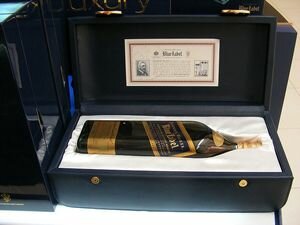British Ambassador Stephen Lillie welcomed the ruling by the World Trade Organisation (WTO) on Philippine taxes on liquour imports.

Premium brand imported labels like Johnnie Walker should come down in price if the gov't accepts the WTO ruling: Photo Credit?Mattes?
"We welcome the ruling in favour of EU exporters of liquour to the Philippines. This upholds a long-standing concern of the UK that current Philippine rules are discriminatory. I hope that the Philippine Government will take immediate steps to achieve strict compliance with WTO rules, which I believe is consistent with President Aquino's stated wish to make the Philippines a more business-friendly environment," said Lillie.
Derek Page, director of UK Trade and Investment (UKTI) in Manila added, "From the perspective of the UK spirits industry, a more simple and non-discriminatory tax structure with a reasonable rate will not only present opportunities for international spirits, but also help grow tax revenue for government and reduce non-tax paid alcohol. Overall this result will benefit the entire industry both local and international, as well as government and consumers."
Have You Been Affected? Click Here
Britain is the largest European investor in the Philippines, while bilateral trade between the two countries grew by 23% last year. The UK Government is committed to maintaining sustainable economic growth by creating favourable conditions for international trade and investment with other countries, including the Philippines. With one of the most open economies in the world, flexible labour markets and the most competitive tax system in the G20, the UK is a world-class location for international business and ranked by the World Bank as first in Europe and fourth in the world for "ease of doing business."
Background:
On 29 July 2009 the European Union requested WTO consultations with the Philippines regarding the discriminatory excise taxation regime on distilled spirits in the Philippines market. This tax regime establishes a different treatment according to the raw materials used in the production of the distilled spirits.Domestic produced spirits are subject to a flat specific rate, while virtually all imported spirits are subject to a system of price bands at substantially higher taxes.
By 2009, tax rates applied to imported products are from 10 to almost 50 times higher than those applied to domestic spirits, depending on the net retail price of the imported product. This amounts to a violation of Article III: 2 of the General Agreements on Tariff and Trade (GATT).
EU exporters asserted that they suffered a steady decline in sales due to the tax differential. In fact, from 2004 to 2007 EU exports of spirits to the Philippines have more than halved from around ?37 million to ?18 million.
The Philippine Government has recognised on several instances in the past the incompatibility of the current excise tax regime with WTO obligations. Moreover, the Department of Finance of the Philippines submitted in 2009 a draft Bill to Congress that would redress the situation, which was not enacted in law.
WTO consultations held in Manila on 8 October 2009 failed to bring a solution and confirmed the WTO inconsistency of the current excise tax regime on distilled spirits. Therefore the EU proceeded in December 2009 to request the establishment of a WTO dispute settlement panel. The United States filed a similar case in March 2010.
Want To Contribute Stories/Features? Click Here
310
Posted at: 23:46 | Add Comment  |
|  |
|  del.icio.us
del.icio.us